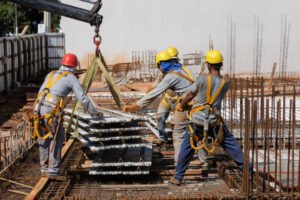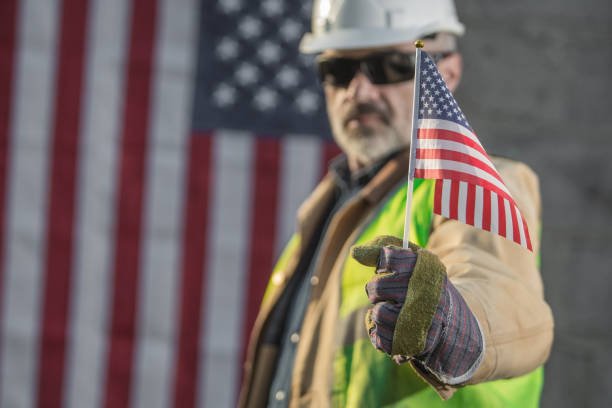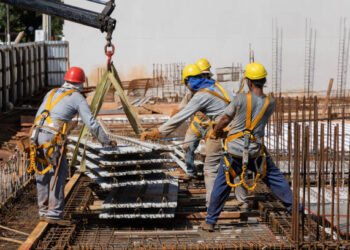The United States of America is in no doubt, one of the world’s most powerful countries in the whole world. Whether you’re already in the U.S. or planning to move, construction laborer jobs offer real opportunities for those willing to get their hands dirty and work hard. But landing one isn’t just about muscle, lol..it’s about strategy. In this my post, I’m going to guide you on what and which strategy you can use to secure this job in USA easily.
Why Construction Laborer Jobs Are in Demand in the USA
The construction industry in the United States has been experiencing consistent growth over the past decade. Massive investments have been made in infrastructure, commercial development, and housing. As cities continue to expand and aging infrastructure is being replaced, an increased need for labor has been created.
Labor Shortages and High Demand in Key States
Chronic labor shortages have been reported in several states, especially where population growth and economic development are strong. In states like Texas, Florida, and California, the demand for construction workers has outpaced the available workforce. As a result, construction laborer positions are often left unfilled, creating opportunities for new workers to be hired quickly.
Infrastructure and Housing Developments on the Rise
A renewed focus on rebuilding roads, bridges, airports, and housing has been announced at both state and federal levels. Projects funded through public and private partnerships have created thousands of construction jobs across the country, further increasing demand in the sector.
What Construction Laborers Do?
Construction laborers are expected to perform a variety of hands-on tasks to support building projects. These duties include:
- Site preparation (clearing debris, setting up barricades)
- Material handling (loading, unloading, and organizing supplies)
- Operating basic equipment and tools (such as jackhammers, drills, and forklifts)
- Assisting skilled tradespeople (such as carpenters, electricians, and plumbers)
All these tasks are carried out under the supervision of site managers or forepersons.
Common Work Environments
Laborers are commonly employed in different construction settings:
- Residential projects: including homes, apartments, and townhouses
- Commercial developments: such as shopping centers, schools, and hospitals
- Highway and infrastructure projects: like road repairs, bridge maintenance, and public transit upgrades
Each setting comes with its own set of challenges and safety procedures that must be followed.
Physical Requirements and Conditions
The role of a construction laborer is physically demanding. Long hours, exposure to weather elements, lifting heavy objects, and standing for extended periods are to be expected. Personal protective equipment (PPE) such as helmets, gloves, boots, and high-visibility clothing is typically required and must be worn at all times on-site.
Basic Qualifications Needed For the Job
Age and Physical Fitness
Most construction jobs require workers to be at least 18 years old and in good physical condition. Strength, stamina, and coordination are considered important attributes for this role.
Education Requirements
Although a high school diploma or equivalent is often preferred, it is not always required. Many laborers are trained on the job, and employers may prioritize experience or work ethic over formal education.
Training and Apprenticeships
Training is usually provided on the job, but some laborers gain a competitive edge by completing formal apprenticeship programs offered by unions or trade organizations. These programs are designed to provide a mix of hands-on experience and classroom instruction.
English Proficiency
While English proficiency is helpful, especially for understanding safety instructions and communicating with supervisors, it is not always a strict requirement. On many work sites, bilingual teams are employed and translated materials may be provided.

Legal Requirements for Foreign Workers
U.S. Work Visas That Permit Construction Labor
Foreign nationals must be legally authorized to work in the U.S. One common option is the H-2B Temporary Non-Agricultural Worker Visa, which allows employers to hire foreign laborers for seasonal or peak-period work. This visa is employer-sponsored and must be applied for through U.S. Citizenship and Immigration Services (USCIS).
Green Card Holders and Permanent Residents
Individuals holding a green card (permanent resident status) are legally permitted to work in the U.S. without needing a visa sponsor. They can apply for construction jobs like any American citizen.
Companies That Sponsor Foreign Laborers
Certain companies and labor contractors in the U.S. are approved to sponsor foreign workers through the H-2B program. These employers must demonstrate a shortage of local workers and provide appropriate wages and housing (if required).
The Importance of Legal Employment
It is crucial that all work is done under legal authorization. Unauthorized employment can lead to deportation, wage theft, and a ban on future entry into the United States. Workers are strongly advised to avoid offers from employers who do not provide proper documentation.
Where and How to Find Construction Jobs
Online Job Boards
A wide range of construction laborer positions are listed on popular job sites such as:
- Indeed.com
- ZipRecruiter.com
- Craigslist.org (especially in local city listings)
- ConstructionJobs.com (specialized in the construction sector only)
These platforms allow searches by location, salary, and job type. Resumes should be submitted online and applications should be followed up promptly.
Union Job Postings
Unions like the Laborers’ International Union of North America (LIUNA) often post job openings on their websites or bulletin boards. Becoming a union member can provide access to higher wages, job security, training programs, and benefits.
Staffing Agencies Specializing in Construction
Construction staffing firms, such as PeopleReady, Tradesmen International, and CLP Resources, are known for hiring both temporary and long-term laborers. These agencies often provide rapid placement and daily pay options.
Local Trade Centers and Word of Mouth
Construction jobs are also found through local community centers, trade schools, and by asking around at construction sites. Many jobs are never formally advertised, and positions are often filled based on referrals or direct inquiries.
Tips for Building a Strong Job Application
Resume Tips for Laborer Jobs
A construction laborer’s resume should be kept simple and direct. It is recommended that:
- Relevant past jobs, especially those involving manual labor or teamwork, are listed clearly.
- Short descriptions of job duties and achievements are included.
- Reliability, punctuality, and willingness to work flexible hours are highlighted.
Buzzwords such as “physically fit,” “team-oriented,” and “safety-conscious” are commonly appreciated by employers in this field.
Showcasing Soft Skills
Even if formal education or certifications are limited, soft skills can help a candidate stand out. Traits such as:
- Punctuality
- Team collaboration
- The ability to follow instructions
- Problem-solving on the job
…should be emphasized during interviews or in cover letters. These qualities are often evaluated just as highly as technical skills.
Certifications That Boost Hiring Chances
Certain certifications can increase the likelihood of being hired. Some widely recognized credentials include:
- OSHA 10/30 Certification – Shows a solid understanding of safety procedures on construction sites.
- Forklift Operator License – Required for material handling tasks involving machinery.
- CPR/First Aid Certification – May be valued on job sites with limited medical response times.
Such certifications can usually be obtained through local vocational schools, unions, or online programs.
How Do you Prepare for Interviews?
Common Interview Questions for Construction Laborers
Here are some of the interview questions a construction laborer job candidate is likely to get during an interview with tne job interviewer. Some Candidates may be asked:
- “Can you describe a time you worked as part of a team?”
- “Are you comfortable lifting heavy objects or working outdoors?”
- “How do you ensure safety on the job?”
- “Are you willing to work weekends or overtime?”
Prepared, honest responses will reflect confidence and readiness for the job.
Dress Appropriately (Dress Code)
It is advised that applicants attend interviews in clean, rugged clothing, not overly formal like banker, but neat and work-appropriate. Steel-toe boots or work shoes can also show familiarity with the job environment.
Emphasize Safety and Willingness to Learn
Employers prefer workers who understand the importance of site safety and who show eagerness to improve. Expressing an interest in learning new skills or pursuing certifications is often viewed positively.
On-the-Job Success: How do you Keep and Grow Your Role?
Punctuality and Dependability
Construction sites rely on teamwork and timing. Being on time consistently and ready to work can lead to extended contracts or permanent positions.
Following Rules and Instructions
Safety protocols and supervisor instructions must be followed precisely and properly. Workers who pay attention and avoid risky behavior are typically retained longer.
Taking Initiative
Asking questions, helping co-workers, and volunteering for tasks show initiative. These traits are often recognized and rewarded with additional responsibilities or promotions.
Exploring Growth Opportunities
Over time, many laborers train in areas like:
- Carpentry
- Drywall installation
- Heavy equipment operation
- Plumbing or electrical work
Such growth can result in higher pay and job security. Unions and trade schools can assist with further skill development.
Some Red Flags to Avoid
Lack of Written Contracts
If a job offer is made without a written agreement outlining pay, hours, and responsibilities, it should be considered a warning sign. Written documentation protects both employer and worker.
Unsafe Working Conditions
A workplace without basic safety measures (helmets, gloves, scaffolding support, etc.) should be reported or avoided. Health and safety must be prioritized over wages.
Illegal Payments or Document Withholding
If an employer requests upfront fees, bribes, or retains legal documents, the job is likely exploitative. These practices are illegal and should be reported to labor protection agencies.
Most FAQs
1. Do I need a college degree to become a construction laborer in the USA?
No. A college degree is not required. Most laborer positions only require basic education (such as a high school diploma or equivalent), and many provide on-the-job training.
2. Can foreigners legally work construction jobs in the USA?
Yes, but only with proper work authorization. Foreign workers must have a valid work visa (such as the H-2B seasonal visa) or be permanent residents (green card holders). Working without authorization is illegal and can result in serious penalties.
3. How can I apply for an H-2B visa to work in construction?
You cannot apply directly. A U.S. employer must petition for you by proving there is a shortage of American workers. Once approved, you can apply for the H-2B visa at your local U.S. embassy or consulate.
4.What should I do if I’m being treated unfairly on the job?
If you’re facing unsafe conditions, wage theft, or discrimination, you can contact:
-
OSHA (for safety issues): www.osha.gov
-
U.S. Department of Labor – For Wage and Hour Division: www.dol.gov/agencies/whd
-
Local legal aid or immigrant worker rights organizations
5. How much do construction laborers get paid?
Wages vary by state and experience. On average, construction laborers in the U.S. earn between $18 to $27 per hour. Candidates likely to get higher wages in states like California, New York, and Massachusetts.
6. Is speaking English necessary to get hired?
While not always mandatory, basic English skills are very helpful, especially for understanding safety instructions and communicating with supervisors. Some employers may offer bilingual support or hire workers on multilingual teams.

Building a Better Life, One Job at a Time (Conclusion)
Encouragement for Job Seekers
Construction laborer jobs in the U.S. offer real, hands-on work and can provide a strong foundation for a better life. For those ready to commit, follow rules, and learn on the job, these roles can lead to long-term employment, steady income, and career growth.
From Entry-Level to Skilled Trades
Many skilled professionals in plumbing, masonry, or site management started as general laborers. The path may begin with a shovel or broom, but with a strong dedication and the right mindset, it can lead to leadership, licensure, or even business ownership.


















Sir I hereby apply for job opportunity to work and settle down abroad I will be grateful if I’m granted Thanks Jerry Eyo
Hi happy Sunday
08145787546